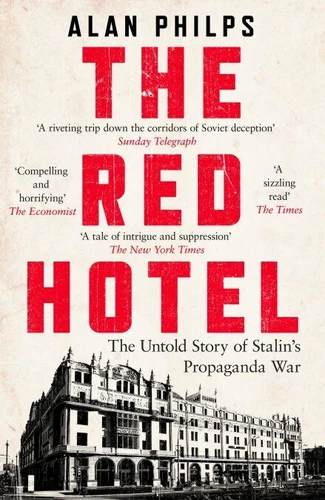The Red Hotel. The Untold Story of Stalin’s Disinformation War
Par :Formats :
Disponible dans votre compte client Decitre ou Furet du Nord dès validation de votre commande. Le format ePub protégé est :
- Compatible avec une lecture sur My Vivlio (smartphone, tablette, ordinateur)
- Compatible avec une lecture sur liseuses Vivlio
- Pour les liseuses autres que Vivlio, vous devez utiliser le logiciel Adobe Digital Edition. Non compatible avec la lecture sur les liseuses Kindle, Remarkable et Sony
- Non compatible avec un achat hors France métropolitaine
 , qui est-ce ?
, qui est-ce ?Notre partenaire de plateforme de lecture numérique où vous retrouverez l'ensemble de vos ebooks gratuitement
Pour en savoir plus sur nos ebooks, consultez notre aide en ligne ici
- Nombre de pages464
- FormatePub
- ISBN978-1-0354-0134-5
- EAN9781035401345
- Date de parution26/04/2023
- Protection num.Adobe DRM
- Infos supplémentairesepub
- ÉditeurHeadline
Résumé
'A riveting trip down the corridors of Soviet deception' Sunday Telegraph (Five-Star Review)'Philps' book vindicates the value of truth' Washington Post'Philps has an eye for detail and a heart for those left behind' The Times'A tale of intrigue and suppression' New York Times'A compelling and often horrifying tale of moral degradation and occasional heroism superbly told' Economist'An engaging and insightful account of foreign correspondents living in the Moscow landmark during the Second World War' History TodayReporters.
Translators. Lovers. Spies. In THE RED HOTEL: THE UNTOLD STORY OF STALIN'S PROPAGANDA WAR, former Daily Telegraph Foreign Editor and Russia expert Alan Philps sets out the way Stalin created his own reality by constraining and muzzling the British and American reporters covering the Eastern front during the war and forcing them to reproduce Kremlin propaganda. War correspondents were both bullied and pampered in the gilded cage of the Metropol Hotel.
They enjoyed lavish supplies of caviar and had their choice of young women to employ as translators and to share their beds. While some of these translators turned journalists into robotic conveyors of Kremlin propaganda, others were brave secret dissenters who whispered to reporters the reality of Soviet life and were punished with sentences in the Gulag. Through the use of British archives and Russian sources, the story of the role of the women of the Metropol Hotel and the foreign reporters they worked with is told for the first time.
This revelatory story will finally lift the lid on Stalin's operation to muzzle and control what the Western allies' writers and foreign correspondents knew of his regime's policies to prosecute the war against Hitler's rampaging armies from June 1941 onwards.
Translators. Lovers. Spies. In THE RED HOTEL: THE UNTOLD STORY OF STALIN'S PROPAGANDA WAR, former Daily Telegraph Foreign Editor and Russia expert Alan Philps sets out the way Stalin created his own reality by constraining and muzzling the British and American reporters covering the Eastern front during the war and forcing them to reproduce Kremlin propaganda. War correspondents were both bullied and pampered in the gilded cage of the Metropol Hotel.
They enjoyed lavish supplies of caviar and had their choice of young women to employ as translators and to share their beds. While some of these translators turned journalists into robotic conveyors of Kremlin propaganda, others were brave secret dissenters who whispered to reporters the reality of Soviet life and were punished with sentences in the Gulag. Through the use of British archives and Russian sources, the story of the role of the women of the Metropol Hotel and the foreign reporters they worked with is told for the first time.
This revelatory story will finally lift the lid on Stalin's operation to muzzle and control what the Western allies' writers and foreign correspondents knew of his regime's policies to prosecute the war against Hitler's rampaging armies from June 1941 onwards.
'A riveting trip down the corridors of Soviet deception' Sunday Telegraph (Five-Star Review)'Philps' book vindicates the value of truth' Washington Post'Philps has an eye for detail and a heart for those left behind' The Times'A tale of intrigue and suppression' New York Times'A compelling and often horrifying tale of moral degradation and occasional heroism superbly told' Economist'An engaging and insightful account of foreign correspondents living in the Moscow landmark during the Second World War' History TodayReporters.
Translators. Lovers. Spies. In THE RED HOTEL: THE UNTOLD STORY OF STALIN'S PROPAGANDA WAR, former Daily Telegraph Foreign Editor and Russia expert Alan Philps sets out the way Stalin created his own reality by constraining and muzzling the British and American reporters covering the Eastern front during the war and forcing them to reproduce Kremlin propaganda. War correspondents were both bullied and pampered in the gilded cage of the Metropol Hotel.
They enjoyed lavish supplies of caviar and had their choice of young women to employ as translators and to share their beds. While some of these translators turned journalists into robotic conveyors of Kremlin propaganda, others were brave secret dissenters who whispered to reporters the reality of Soviet life and were punished with sentences in the Gulag. Through the use of British archives and Russian sources, the story of the role of the women of the Metropol Hotel and the foreign reporters they worked with is told for the first time.
This revelatory story will finally lift the lid on Stalin's operation to muzzle and control what the Western allies' writers and foreign correspondents knew of his regime's policies to prosecute the war against Hitler's rampaging armies from June 1941 onwards.
Translators. Lovers. Spies. In THE RED HOTEL: THE UNTOLD STORY OF STALIN'S PROPAGANDA WAR, former Daily Telegraph Foreign Editor and Russia expert Alan Philps sets out the way Stalin created his own reality by constraining and muzzling the British and American reporters covering the Eastern front during the war and forcing them to reproduce Kremlin propaganda. War correspondents were both bullied and pampered in the gilded cage of the Metropol Hotel.
They enjoyed lavish supplies of caviar and had their choice of young women to employ as translators and to share their beds. While some of these translators turned journalists into robotic conveyors of Kremlin propaganda, others were brave secret dissenters who whispered to reporters the reality of Soviet life and were punished with sentences in the Gulag. Through the use of British archives and Russian sources, the story of the role of the women of the Metropol Hotel and the foreign reporters they worked with is told for the first time.
This revelatory story will finally lift the lid on Stalin's operation to muzzle and control what the Western allies' writers and foreign correspondents knew of his regime's policies to prosecute the war against Hitler's rampaging armies from June 1941 onwards.




